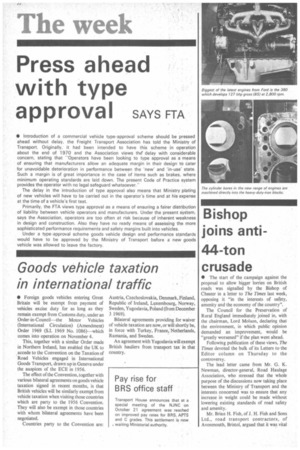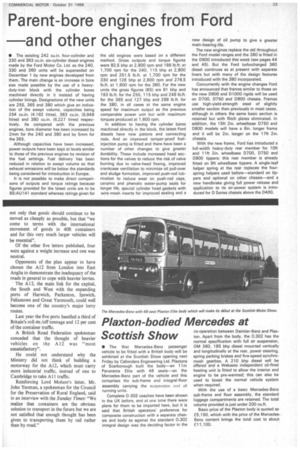Bishop joins anti 44-ton crusade
Page 24

Page 25

If you've noticed an error in this article please click here to report it so we can fix it.
• The start of the campaign against the proposal to allow bigger lorries on British roads was signalled by the Bishop of Chester in a letter to The Times last week, opposing it "in the interests of safety, amenity and the economy of the country".
The Council for the Preservation of Rural England immediately joined in, with the chairman, Lord Molson, declaring that the environment, in which public opinion demanded an improvement, would be "greatly worsened" if the plan went ahead.
Following publication of these views, The Times devoted the bulk of its Letters to the Editor column on Thursday to the controversy.
The lead letter came from Mr. G. K. Newman, director-general, Road Haulage Association, who stressed that the whole purpose of the discussions now taking place between the Ministry of Transport and the interests concerned was to ensure that any increase in weight could be made without lowering existing standards of road safety and amenity.
Mr. Brian H. Fish, of I. H. Fish and Sons Ltd., road transport contractors, of Avonmouth, Bristol, argued that it was vital
not only that goods should continue to be moved as cheaply as possible, but that "we come to terms with the international movement of goods in 40ft containers and for this very much larger vehicles will be essential".
Of the other five letters published, four were against a weight increase and one was neutral.
Opponents of the plan appear to have chosen the Al2 from London into East Anglia to demonstrate the inadequacy of the roads in general to cope with heavier lorries.
The Al2, the main link for the capital, the South and West with the expanding ports of Harwich, Parkeston, Ipswich. Felixstowe and Great Yarmouth, could well become one of the country's major lorry routes.
Last year the five ports handled a third of Britain's roll-r!rn /off tonnage and 12 per cent of the container traffic.
A British Road Federation spokesman conceded that the thought of heavier vehicles on the A 12 was "most unsatisfactory".
He could not understand why the Ministry did not think of building a motorway for the Al2, which must carry more industrial traffic, instead of one to Cambridge to take All traffic.
Reinforcing Lord Molson's letter, Mr. John Yeoman, a spokesman for the Council for the Preservation of Rural England, said in an interview with the Sunday limes: "We realize that containers are the obvious solution to transport in the future but we are not satisfied that enough thought has been given to transporting them by rail rather than by road."


























































































































